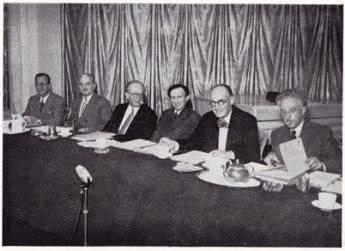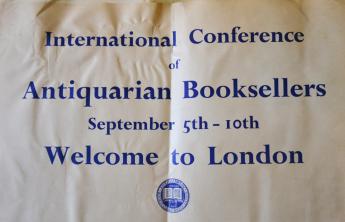Events
1949 - London

International League of Antiquarian Booksellers
By John Carter
The week of September 5th to 10th was a significant one in the world of books; for within its span was contained the third international congress of antiquarian booksellers. This was the first held under the auspices of the newly formed International League, for which the Amsterdam and Copenhagen conferences had laid the foundations; and it was held, appropriately, in London, the home of the oldest national association, which acted as host on what proved to be a memorable occasion.
In this country old books - even rare books and first editions - are not normally considered newsworthy. The exceptions are apt to be due to what journalists call "human interest," and a First Folio must stun an innocent bystander before it can get into the papers. Without disrespect to the many photogenic ladies who adorned the Congress, if there were room for portraits on this page they would be those of M. Kundig, of Geneva, the President of the International League; of Mr. P. H. Muir, of Elkin Matthews, its Vice-President and fellow-architect; of Mr. Herzberger, of Amsterdam, who originally conceived it; and of Mr. C. D. Massey, of Pickering and Chatto, the President of the A.B.A., on whose shoulders lay the responsibility for the organisation - and the success - of its first plenary congress.
For the League, only one year old, faced its first real test at this conference. And it is not, I think, too early to conclude that a tentative, a hopeful, an only partially integrated body, achieved in the course of a single week a remarkable measure of stability, confidence and harmony. The arrangements for corporate hospitality worked smoothly, from the dinner at the Guildhall on Monday, through visits to the British Museum, to the Royal Library at Windsor, to Cambridge; through a tour of London, a Promenade Concert, and a vin d'honneur given by the British Council and graced by the presence of Sir Stanley Unwin; to the farewell dinner and dance on the Saturday evening. Toasts were drunk and speeches were made. Among the many good ones I recall with particular pleasure Mr. Muir's, Mrs. Massey's (in French), Mme. Kundig's, and M. de Nobele's elegant demonstration of a Frenchman being witty in English; while Mr. Ifan Kyrle Fletcher's graceful performance as master of ceremonies showed that he has an alternative career awaiting him if he ever gets tired of bookselling.
Agreeable, however, as was the sociable side of the conference; valuable as it was to exchange views with delegates from Belgium, Denmark, Finland, France, Holland, Italy, Norway, Sweden and Switzerland, not to mention an "observer" from the United States, in the person of Mr. Laurence Gomme (President of the recently-formed and not yet affiliated American Association); practically fruitful as may have been the presence of fifty foreign booksellers in London - one dealer alone did £2,000 worth of business with the visitors: yet the really important work was done in the business sessions of the conference. Despite the heat, the President's report, the budget, and a substantial list of agenda were thoroughly debated. And it was convincing evidence of the democratic character of the meeting that the voice of (say) the Norwegian delegate, representing an association of only half-a-dozen members, was heard as respectfully as that of the President of the French Syndicat, which numbers 360. English and French arc the official languages of the League; and it was fortunate that M. Kundig's exceptional talents as chairman included the ability to sum up, to persuade, to rally or to joke, with almost equal facility in either language.

But what, the layman may well ask, is the function of an International League of Antiquarian Booksellers? Why should they need to unite, and what do they expect to do when united? It is not only a fair question for a layman: it is a question which had been freely (and sometimes combatively) asked by many members of the British Association - and doubtless by some of their Continental colleagues. Well, the League, as an officially recognised international body, can exert - indeed has already begun to exert - on recalcitrant debtors, on obstructive government departments, on regulators of imports and exports, pressure much more effective than even the strongest national association could do.
It is empowered by its constitution to arbitrate in matters of international concern or dispute in the trade, while avoiding any invasion of the sovereignty of the national associations. It can -and is now proceeding to - codify and circulate to all affiliated associations accurate and up-to-date information about the exchange control and import licensing requirements of all member countries. It has nearly completed an international directory of antiquarian booksellers, with their specialities, which will be as valuable to libraries and collectors as to its own members. It is preparing a vocabulary, in seven languages, of the terms used in booksellers' catalogues -how many professionals, let alone amateurs, know the Italian or Spanish for "foxed" or "with all faults"? how many more, if confronted with epuise, might not guess that it meant "bruised" or "shaken" (rather than "out of print")?
The International League, warmly welcomed and formally recognised by Unesco, is not just another vague gesture of European amity, nor an excuse for junketing in foreign parts. Antiquarian booksellers, here and on the Continent, have little time or money for the latter, and, being mostly staunch individualists, are temperamentally disinclined to the former. It is, on the contrary, an imaginative yet hard-headed organisation dedicated to the proposition that more and better understanding means more and better business. The League owes a great debt to its founders and promoters, especially to Messrs. Kundig and Muir, but its future is in the hands of its individual members, who already number nearly a thousand, and on whose confidence and support will depend not only its financial stability and professional credit, but also the readiness of its committee to continue shouldering an increasing volume of executive work and responsibility. The London congress should have convinced any doubters that their confidence will not be misplaced.
(Reprinted from "The Bookseller." September 17th, 1949, by kind permission of the Editor. Published in the ABA Newsletter, Special Issue 1949)
